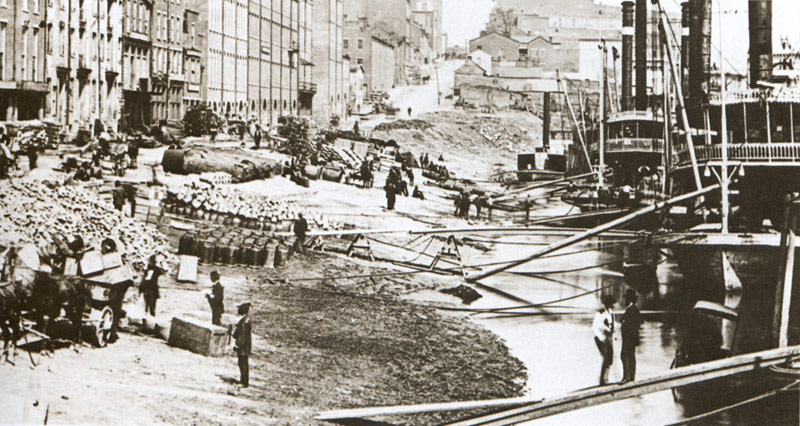Nashville, founded in 1779, quickly became a pivotal trading post due to its strategic location along the Cumberland River, facilitating commerce and settlement in the region.
Early Settlement and Founding
Before becoming the bustling city it is today, Nashville was home to Indigenous peoples, including the Cherokee and Chickasaw tribes, who lived in the region for centuries. These groups thrived along the Cumberland River, relying on its fertile lands and abundant resources. The arrival of European explorers in the 18th century, particularly French fur traders, marked the beginning of significant changes to the area.
In 1779, James Robertson and John Donelson led settlers to establish Fort Nashborough, named in honor of General Francis Nash, a Revolutionary War hero. This trading post quickly became a key settlement due to its strategic location along the Cumberland River, facilitating commerce and providing a vital link to other parts of the growing frontier. The fort laid the foundation for the city of Nashville, which was officially chartered in 1806, setting the stage for its growth as a regional center of trade and culture.
19th Century Developments
Nashville’s importance grew significantly during the 19th century, as it became a hub for commerce, transportation, and education. The city’s strategic location along the Cumberland River made it a vital trade and transportation center, helping it flourish economically. By the mid-1800s, Nashville was a thriving city with a burgeoning population and established institutions, including the University of Nashville, reflecting its early commitment to education and culture.
The Civil War brought dramatic changes to the city. In 1862, Nashville became the first Confederate state capital to fall to Union forces, due to its critical location and extensive rail and river networks. The city played a significant role as a Union supply depot throughout the war. The Battle of Nashville in December 1864 was a decisive victory for Union forces, marking a turning point in the conflict. After the war, Nashville entered a period of reconstruction and growth, rebuilding its economy and infrastructure while maintaining its regional significance. This era laid the foundation for Nashville’s emergence as a cultural and economic powerhouse in the years to come.
20th Century Transformation
The 20th century marked a period of remarkable transformation for Nashville, cementing its reputation as a cultural and economic hub. The city earned its nickname, “Music City,” with the establishment of the Grand Ole Opry in 1925, a radio show that became a cornerstone of the country music industry. Artists from across the country flocked to Nashville, making it the heart of the genre and solidifying its global influence. The rise of institutions like the Ryman Auditorium further positioned the city as a premier destination for musicians and fans alike.
Nashville also played a pivotal role in the Civil Rights Movement during the 1960s. The city was a center for nonviolent protest, with events like the Nashville sit-ins of 1960 leading to the successful desegregation of local lunch counters. Figures such as John Lewis and Diane Nash emerged from Nashville, shaping the national movement. By the latter half of the century, the city diversified its economy, with healthcare and education joining music as key industries. This period of growth and change set the stage for Nashville’s modern renaissance, blending its historic roots with forward-looking innovation.
Modern Era
In the 21st century, Nashville has emerged as a dynamic metropolis, blending its rich history with modern innovation. The city’s economy has diversified significantly, becoming a hub for healthcare, technology, and education. With over 500 healthcare companies based in the city, including industry giants like HCA Healthcare, Nashville has earned the nickname “Healthcare Capital of the U.S.” Universities such as Vanderbilt and Belmont contribute to a highly educated workforce, further supporting the city’s economic expansion.
Culturally, Nashville has experienced a renaissance, with its culinary scene, arts community, and tourism industry flourishing. The city has embraced its musical heritage while also expanding into other genres and creative industries. Landmarks like the Country Music Hall of Fame, coupled with vibrant neighborhoods like The Gulch and East Nashville, attract millions of visitors annually. This growth has transformed Nashville into a cosmopolitan city with a unique blend of Southern charm and global appeal, ensuring its continued relevance as a cultural and economic leader.
Notable Landmarks and Their Histories
Nashville is home to several iconic landmarks that highlight its rich cultural and historical legacy. The Ryman Auditorium, often called the “Mother Church of Country Music,” is a symbol of the city’s deep connection to the music world. Originally built in 1892 as the Union Gospel Tabernacle, it transitioned into a premier cultural destination, hosting performers from a variety of genres. In 1943, it became the home of the Grand Ole Opry, cementing its role in country music history. Today, it serves as a National Historic Landmark, continuing to host world-class concerts and events that pay homage to its musical heritage.
Another standout landmark is Nashville’s Parthenon Replica, an architectural marvel that represents the city’s commitment to education and the arts. Constructed in 1897 for the Tennessee Centennial Exposition, this full-scale replica of the Parthenon in Athens, Greece, has become a cultural icon. Now a permanent structure in Centennial Park, it houses an art museum and a towering statue of Athena, celebrating Nashville’s nickname, “Athens of the South.” These landmarks exemplify Nashville’s dedication to preserving its history while fostering a vibrant cultural identity.
Reflection on Nashville’s Legacy with AAAC Wildlife Removal of Nashville
Nashville’s journey from a frontier settlement to a thriving metropolitan hub is a testament to its resilience and adaptability. Its rich history, from its early days as Fort Nashborough to its evolution as “Music City,” reflects a city that has continually shaped regional and national narratives. Each chapter of Nashville’s story, from its pivotal role in the Civil War to its modern cultural renaissance, showcases its unique ability to preserve tradition while embracing progress.
As Nashville continues to grow and thrive, AAAC Wildlife Removal of Nashville is proud to support the community by ensuring homes and businesses remain safe and secure from unwanted wildlife. Whether you’re exploring historic landmarks, enjoying live music, or building a life in this vibrant city, our team is here to provide expert, humane wildlife solutions. Together, let’s celebrate Nashville’s incredible legacy while looking ahead to an even brighter future!




